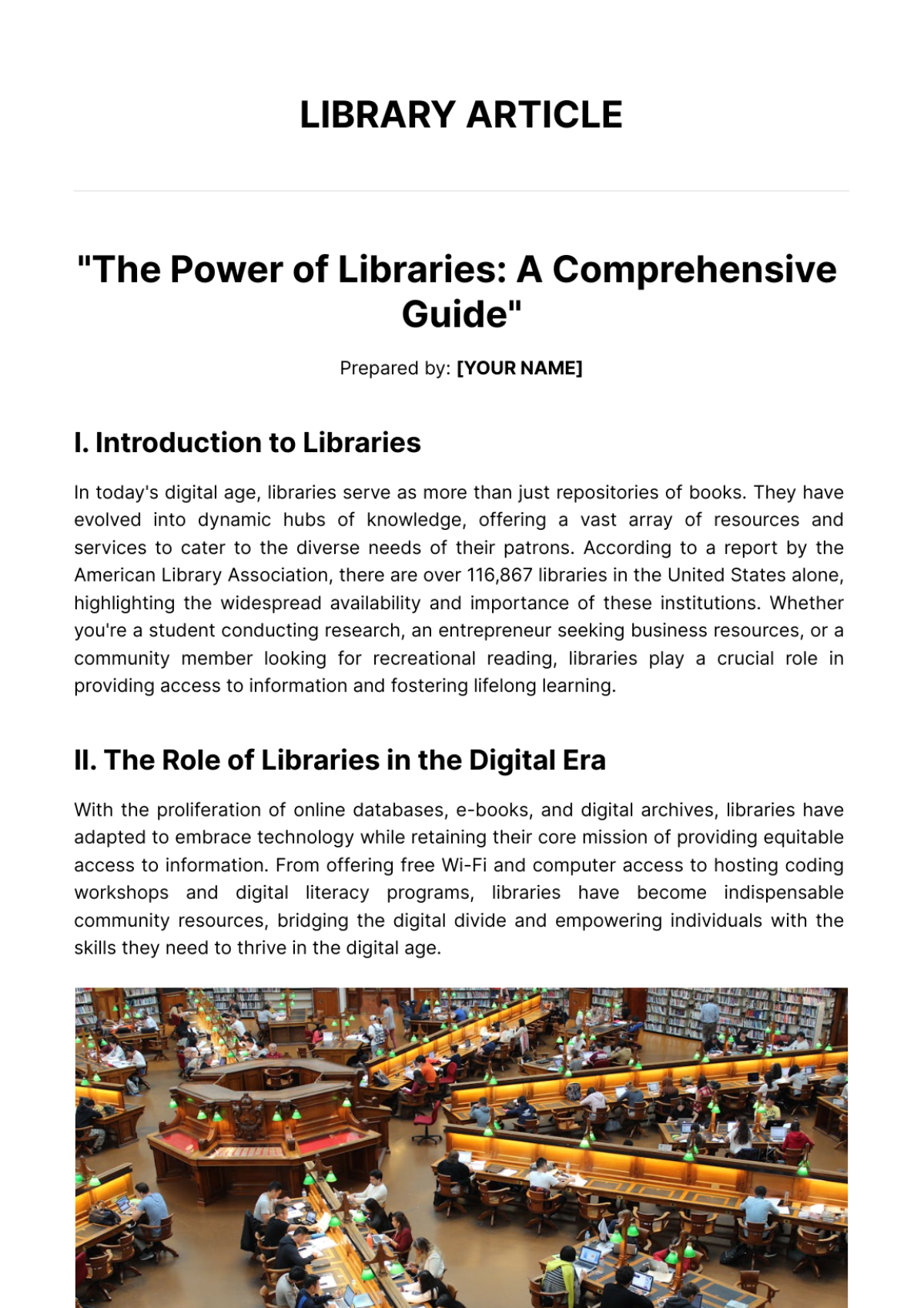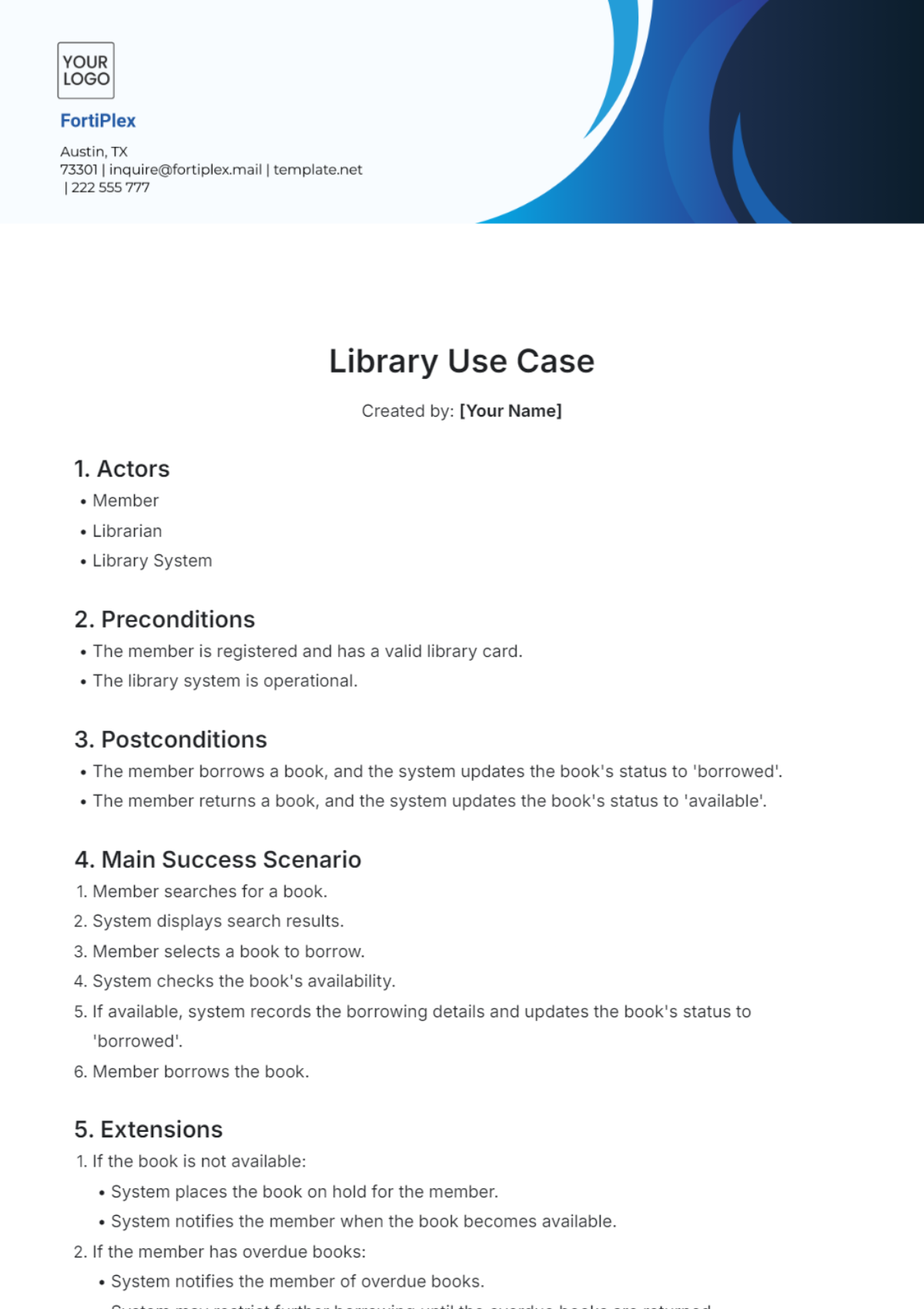Library Journal Article
Title: Evolving Information Management Practices in Libraries: Insights and Innovations for the 2050s and Beyond
Prepared by: [Your Name]
Date: [Date]
I. Abstract
This article explores the state of information management practices in modern libraries as we approach the mid-21st century. The study examines prevailing trends, technological advancements, and management strategies impacting information handling within library environments. Using a detailed literature review, mixed-method methodology, and robust discussion, this paper provides valuable insights and actionable recommendations for library professionals aiming to enhance their information management systems in the context of futuristic advancements.
II. Introduction
Libraries have experienced profound transformations over recent decades, driven by rapid technological advancements and the proliferation of digital resources. As we progress into the 2050s, information management remains a core function of libraries, evolving to accommodate the needs of increasingly digital and data-driven users. This article investigates current practices in information management within modern libraries, identifies emerging challenges and opportunities, and offers strategic recommendations to address future requirements.
III. Literature Review
Extensive literature has documented the evolution of information management in libraries. Recent studies, such as those by Anderson (2052) and Lee (2054), examine the integration of artificial intelligence and machine learning in library systems. Research by Patel (2055) highlights the impact of virtual and augmented reality on user interaction with library resources. This section synthesizes key findings from these and other contemporary studies to provide a thorough overview of the state of information management practices.
IV. Methodology
This study utilizes a mixed-method approach to gather a comprehensive data set. Surveys distributed to a diverse group of library professionals provide quantitative insights, while in-depth interviews with experts offer qualitative perspectives. Additionally, a comparative analysis of case studies from various advanced libraries worldwide enhances the robustness of the findings. Data collection spanned from January 2050 to June 2051, offering a contemporary snapshot of current practices.
V. Results
The study reveals several key findings:
Advanced Resource Management: Libraries are investing heavily in AI-driven resource management systems that enhance the efficiency of information retrieval and personalized user experiences.
User Satisfaction: Satisfaction levels vary based on the integration of virtual reality (VR) and augmented reality (AR) technologies, which significantly impact how users interact with library resources.
Staff Training Gaps: Despite advancements, there is a noticeable gap in training for library staff regarding new technologies such as AI and VR systems. Enhanced training programs are needed to keep staff updated with evolving tools and practices.
These results highlight the importance of continuous professional development and investment in cutting-edge information management systems.
VI. Discussion
The findings suggest that while many libraries have made significant strides in adopting advanced digital management practices, challenges persist. The variation in user satisfaction underscores the need for consistent and effective implementation of new technologies. The gap in staff training, particularly concerning AI and VR, calls for standardized and ongoing professional development programs. Investment in these new technologies is crucial to meet user expectations and enhance the overall efficiency of information management systems.
VII. Conclusion
Modern libraries must prioritize the enhancement of their information management practices to keep pace with technological advancements and the evolving needs of users. This study emphasizes the importance of comprehensive staff training, user-centered system design, and strategic investment in technologies like AI, VR, and AR. Future research should focus on longitudinal studies to track the long-term impacts of these recommendations and explore the potential for further technological innovations.
VIII. References
Anderson, L. (2052). AI and the Future of Library Systems. Journal of Advanced Information Management.
Lee, H. (2054). Virtual Reality in Library User Engagement. Future Library Science Review.
Patel, R. (2055). Augmented Reality: Transforming Library Interactions. International Journal of Library Innovation.










